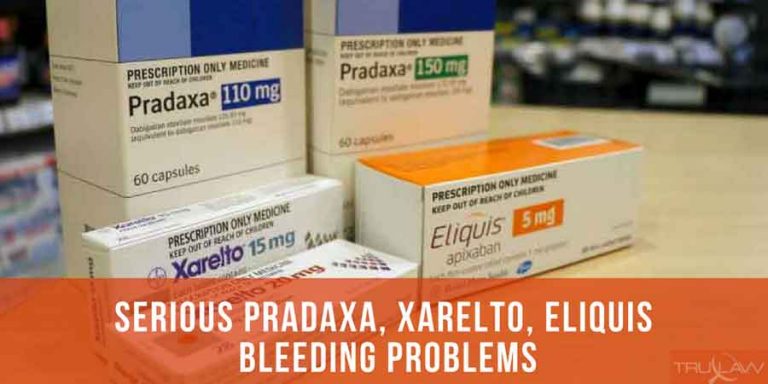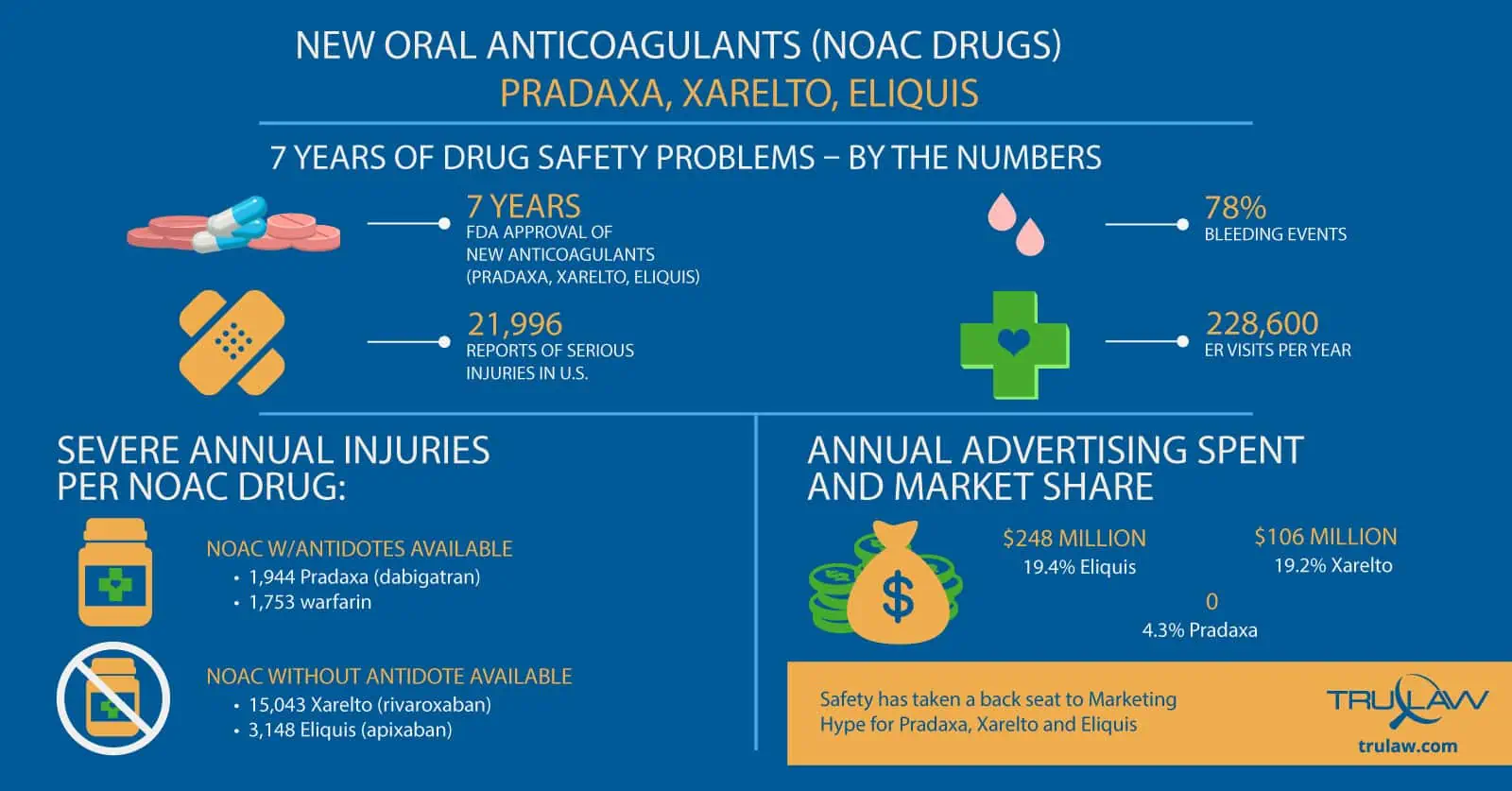Pradaxa and Xarelto Problems 2016 Highest Priority Drug Safety Problem
- Last Updated: July 27th, 2023

Attorney Jessica Paluch-Hoerman, founder of TruLaw, has over 28 years of experience as a personal injury and mass tort attorney, and previously worked as an international tax attorney at Deloitte. Jessie collaborates with attorneys nationwide — enabling her to share reliable, up-to-date legal information with our readers.
Legally Reviewed
This article has been written and reviewed for legal accuracy and clarity by the team of writers and legal experts at TruLaw and is as accurate as possible. This content should not be taken as legal advice from an attorney. If you would like to learn more about our owner and experienced injury lawyer, Jessie Paluch, you can do so here.
Fact-Checked
TruLaw does everything possible to make sure the information in this article is up to date and accurate. If you need specific legal advice about your case, contact us by using the chat on the bottom of this page. This article should not be taken as advice from an attorney.
Pradaxa and Xarelto Problems 2016 Highest Priority Drug Safety Problem
According to the Institute for Safe Medication Practices’ QuarterWatch, an organization that monitors drug safety trends new oral anticoagulants (NOAC drugs), Pradaxa, Eliquis and Xarelto problems have earned them the title of 2016’s highest priority drug safety problem.
These NOAC drugs cause bleeding injuries in 8% to 19% of patients treated.
And, with more than 3.8 million patients prescribed one of these oral anticoagulants this is a problem that will affect more than 300,000 patients per year.
Prior to FDA approval of the newer anticoagulants (NOAC drugs), warfarin had been a standard for preventing unwanted blood clots since 1954.
But the use of warfarin was tricky in that it required bi-weekly monitoring, had quite a few interactions with food and other drugs and required individual dose adjustments generally at a doctors office.
This lack of convenience made for a great marketing campaign for Big Pharma to introduce their new drugs – Pradaxa, Xarelto, and Eliquis.
Big pharma spent hundreds of millions of dollars on advertising these drugs as both superior and more convenient.
Eliquis was the third most advertised drug in 2015, with Bristol-Myers Squibb spending $249 million on advertising just for Eliquis.
The campaign to move to NOAC drugs worked – they now capture more than 40% of the anticoagulant market.
But, seven years after approval of the new oral anticoagulants, it does not appear that the NOAC drugs are living up to either of these hyped benefits.
Several studies have shown that NOAC drugs are clinically equivalent to warfarin and several of the NOAC drugs continue to have major uncontrollable bleeding problems because there is no existing antidote.
Uncontrollable bleeds often lead to hospitalization, further injury and sometimes death.
According to the Institute for Safe Medication Practices, a nonprofit organization educating the healthcare community and consumers about safe medicine, Over the 10-year history of a Center for Disease Control adverse event study, emergency department visits for anticoagulant adverse drug effects increased more than 2-fold.
In fact, studies find that 6.3% of patients exposed to an NOAC drug for 12 months will need to visit the emergency department, with over 3% requiring hospitalization.
The CDC estimates 228,600 individuals will visit the emergency department annually due to anticoagulants.

Prior to 2015, Pradaxa (dabigatran) was associated with thousands of tragic deaths from uncontrollable bleeds in the ER where doctors were helpless to stop the bleed.
But, in October 2015, the FDA approved Praxbind (idarucizumad) as an antidote for Pradaxa bleeds and new studies show that it is working.
Annual injuries for Pradaxa (dabigatran) are down from previous years.
As of August 2017, the FDA has not yet approved an antidote for Factor Xa inhibitors – that is a drug that will stop uncontrollable bleeds for Xarelto (rivaroxaban) or Eliquis (apixaban), although several drugs are in the works (AndexXa was rejected because of manufacturing issues in August 2016).
Over 40% of oral anticoagulant prescriptions in 2016 were for an NOAC drug – with Xarelto and Eliquis both grabbing over 19% of the market share.
Until actions are taken to reduce the risks of this class of drugs, it is likely that NOACs will continue to be a drug safety concern.
QuarterWatch suggests the following practical steps should be taken to help with Pradaxa, Eliquis and Xarelto problems:
- Antidotes for bleeding needed for Xarelto and Eliquis
- Establish guidelines for use of NOACs with other therapy (use with other drugs can double the risk of bleeds, but little information is shared with patients)
- Re-evaluate Xarelto’s once-a-day dosing scheme
- Provide therapeutic ranges for Pradaxa – it is not the best drug for all patients
- Get information out to the public to make sure the NOAC drugs are not overused – especially in atrial fibrillation patients at lower risk of ischemic stroke or older patients with the highest bleeding risks.
If you or a loved one suffered from any Pradaxa, Eliquis and Xarelto problems, you may be able to join the litigation and sue the drug’s manufacturer for financial compensation and make sure to share this information with anyone who may need it.
Table of Contents

Managing Attorney & Owner
With over 25 years of legal experience, Jessica Paluch-Hoerman is an Illinois lawyer, a CPA, and a mother of three. She spent the first decade of her career working as an international tax attorney at Deloitte.
In 2009, Jessie co-founded her own law firm with her husband – which has scaled to over 30 employees since its conception.
In 2016, Jessie founded TruLaw, which allows her to collaborate with attorneys and legal experts across the United States on a daily basis. This hypervaluable network of experts is what enables her to share the most reliable, accurate, and up-to-date legal information with our readers!
Here, at TruLaw, we’re committed to helping victims get the justice they deserve.
Alongside our partner law firms, we have successfully collected over $3 Billion in verdicts and settlements on behalf of injured individuals.
Would you like our help?
At TruLaw, we fiercely combat corporations that endanger individuals’ well-being. If you’ve suffered injuries and believe these well-funded entities should be held accountable, we’re here for you.
With TruLaw, you gain access to successful and seasoned lawyers who maximize your chances of success. Our lawyers invest in you—they do not receive a dime until your lawsuit reaches a successful resolution!
AFFF Lawsuit claims are being filed against manufacturers of aqueous film-forming foam (AFFF), commonly used in firefighting.
Claims allege that companies such as 3M, DuPont, and Tyco Fire Products failed to adequately warn users about the potential dangers of AFFF exposure — including increased risks of various cancers and diseases.
Depo Provera Lawsuit claims are being filed by individuals who allege they developed meningioma (a type of brain tumor) after receiving Depo-Provera birth control injections.
A 2024 study found that women using Depo-Provera for at least 1 year are five times more likely to develop meningioma brain tumors compared to those not using the drug.
Suboxone Tooth Decay Lawsuit claims are being filed against Indivior, the manufacturer of Suboxone, a medication used to treat opioid addiction.
Claims allege that Indivior failed to adequately warn users about the potential dangers of severe tooth decay and dental injuries associated with Suboxone’s sublingual film version.
Social Media Harm Lawsuits are being filed against social media companies for allegedly causing mental health issues in children and teens.
Claims allege that companies like Meta, Google, ByteDance, and Snap designed addictive platforms that led to anxiety, depression, and other mental health issues without adequately warning users or parents.
Transvaginal Mesh Lawsuits are being filed against manufacturers of transvaginal mesh products used to treat pelvic organ prolapse (POP) and stress urinary incontinence (SUI).
Claims allege that companies like Ethicon, C.R. Bard, and Boston Scientific failed to adequately warn about potential dangers — including erosion, pain, and infection.
Bair Hugger Warming Blanket Lawsuits involve claims against 3M — alleging their surgical warming blankets caused severe infections and complications (particularly in hip and knee replacement surgeries).
Plaintiffs claim 3M failed to warn about potential risks — despite knowing about increased risk of deep joint infections since 2011.
Baby Formula NEC Lawsuit claims are being filed against manufacturers of cow’s milk-based baby formula products.
Claims allege that companies like Abbott Laboratories (Similac) and Mead Johnson & Company (Enfamil) failed to warn about the increased risk of necrotizing enterocolitis (NEC) in premature infants.
Here, at TruLaw, we’re committed to helping victims get the justice they deserve.
Alongside our partner law firms, we have successfully collected over $3 Billion in verdicts and settlements on behalf of injured individuals.
Would you like our help?













